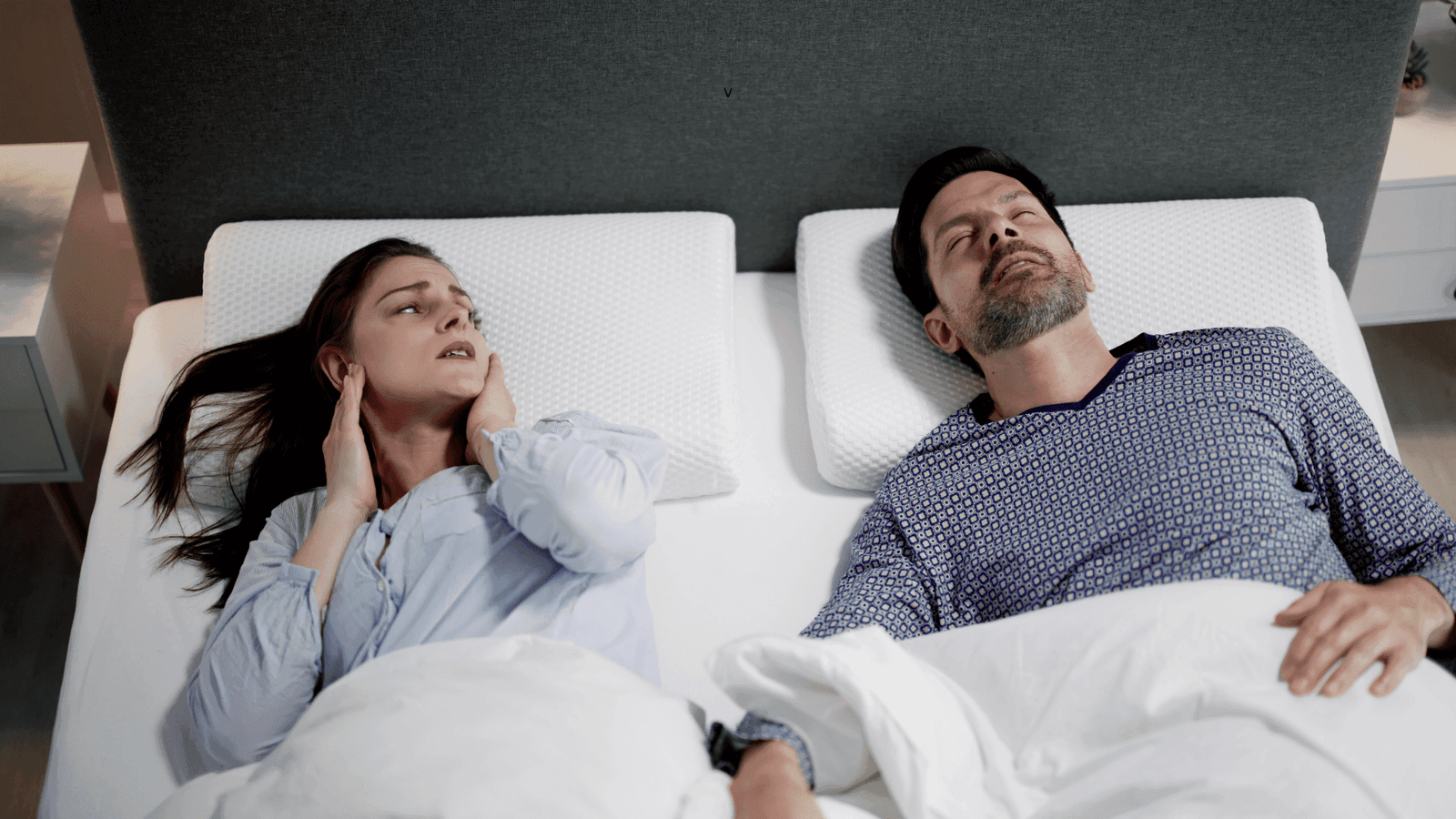Sleep is a shared experience. If your partner is restless, snoring, or breathing irregularly at night, chances are you’re not sleeping soundly either. But beyond the lost hours of rest and a few lighthearted jokes about snoring, there could be a more serious issue at play: sleep apnea.
Convincing someone you care about to seek medical evaluation—especially for something they might not fully believe is a problem—can be challenging. They may dismiss their symptoms as normal, claim they’re just tired from work, or say, “It’s just how I sleep.” But as someone who shares their bed or sees them every day, you may be the first to notice signs that something’s not right.
The good news is that raising the subject doesn’t have to feel confrontational. By learning the common sleep apnea partner signs, you’ll be better equipped to help your loved one take the first step—whether that means encouraging them to try lifestyle changes, book a sleep test, or consult a professional.
At Dr. Gobran Sleep Apnea & TMJ Therapy, our team regularly works with concerned spouses, partners, and family members who’ve noticed subtle but concerning changes in their loved one’s sleep and behavior. And we believe that awareness is the first step toward treatment and relief.
Here are five red flags to look for—and why they shouldn’t be ignored.
1. Loud, Persistent Snoring
Let’s start with the most obvious: loud snoring. It’s often dismissed as a harmless annoyance or a family trait, but when it happens every night and is loud enough to wake you—or be heard from another room—it could indicate a blocked or narrowed airway. This is one of the most common signs of obstructive sleep apnea (OSA).
Not all snoring is related to sleep apnea, but when it’s chronic, punctuated by gasping, or paired with other symptoms like daytime drowsiness, it’s worth a deeper look.
At this point, roughly 150 words in, you might be asking, “What can we do about it if they won’t go to a sleep lab?” The answer: You don’t have to start with drastic measures. There are small, simple lifestyle modifications that may help reduce symptoms—and a dentist trained in sleep medicine can guide that process gently.
2. Pauses in Breathing While Asleep
It can be unsettling to witness your partner stop breathing while asleep, even for just a few seconds. If you find yourself holding your breath waiting for them to take theirs, it’s time to take action.
Breathing pauses are hallmark signs of sleep apnea. The body literally stops airflow—sometimes dozens or even hundreds of times a night—causing oxygen levels to drop. Often, the brain briefly wakes them up to resume breathing, though the sleeper may not recall it the next morning.
These disruptions aren’t just scary—they’re dangerous. Prolonged or untreated sleep apnea can lead to serious health conditions like:
- High blood pressure
- Heart disease
- Stroke
- Type 2 diabetes
While you may feel unsure about bringing up a medical concern, it’s helpful to focus on your observations. You’re not diagnosing—you’re sharing what you’ve seen. That can make all the difference in how the message is received.
3. Excessive Daytime Fatigue or Napping
Is your partner always tired, no matter how many hours they’ve slept? Do they fall asleep watching TV, during conversations, or even behind the wheel?
Chronic fatigue is one of the most telling sleep apnea partner signs. Even if they sleep for 7–8 hours, their brain and body aren’t getting the oxygen and deep sleep cycles needed to feel rested.
This fatigue can build over time, gradually affecting memory, focus, and reaction times. It may also manifest in personality changes—short tempers, poor motivation, or difficulty concentrating.
At around 650 words in, it’s a good time to acknowledge that many people assume tiredness is just a symptom of life’s demands. But if your partner’s exhaustion seems out of proportion to their lifestyle—or if their energy levels used to be higher—it could be sleep apnea hiding in plain sight.
It’s also worth checking out Dr. Gobran’s blog where fatigue-related insights and real-life patient stories help explain how easily sleep apnea symptoms can be mistaken for something else entirely.
4. Mood Swings, Irritability, or Withdrawal
We all have grumpy days—but if your partner’s irritability has become constant or they seem emotionally withdrawn, lack of sleep could be the culprit.
Sleep deprivation impacts mental health. For people with untreated sleep apnea, poor sleep quality can lead to:
- Increased irritability
- Heightened anxiety or stress
- Low mood or signs of depression
- A general loss of interest in daily life
Often, these emotional shifts occur so gradually that the person doesn’t connect them to sleep quality. But as the observer, you may see a pattern—particularly if mood dips are paired with loud snoring or daily tiredness.
Approach the topic gently, using empathy rather than blame. Phrases like, “I’ve noticed you haven’t been feeling like yourself lately,” or “I’m worried about how tired you seem,” can open up conversation without judgment.
Even if they’re reluctant to seek help, suggesting a simple screening or home test could feel like a manageable first step.
5. Tossing, Turning, and Disrupted Sleep Behavior
If your partner is constantly changing positions, jerking awake, or sleeping restlessly throughout the night, it could be more than restlessness. Sleep apnea disrupts the sleep cycle, often causing fragmented sleep and unproductive rest.
Some people with sleep apnea also experience:
- Frequent waking to use the bathroom
- Night sweats
- Restless leg movements
- Gasping or choking sounds
What does this mean for you, the bed partner? Sleepless nights, stress, and feeling helpless.
By helping them recognize these patterns as potential health red flags, you’re doing more than advocating—you’re protecting their long-term well-being.
How to Start the Conversation (Without Causing Conflict)
Even when the signs are obvious, bringing up sleep apnea can feel tricky—especially if your partner tends to downplay health issues. Here are a few tips for approaching the topic constructively:
- Pick the right moment. Choose a calm, relaxed time—not when you’re both groggy or frustrated from lack of sleep.
- Use “I” statements. Say things like, “I’ve been worried about how tired you seem,” or “I noticed you stopped breathing last night.”
- Share the facts. Sleep apnea is common, treatable, and often underdiagnosed.
- Offer support. Volunteer to go with them to an appointment or help research providers.
- Start small. Suggest a questionnaire, phone consultation, or at-home test as a low-pressure entry point.
When it feels like you’re on the same team, your partner is more likely to listen and consider taking action.
What Happens Next?
If your partner agrees to seek help, the next steps are simple. Most dental sleep specialists start with:
- A short screening questionnaire
- An in-office evaluation of their airway and jaw structure
- A home sleep test (if appropriate) or a referral for a clinical sleep study
If diagnosed, many patients are relieved to find there are non-CPAP options available. Custom oral appliances, created by dental sleep experts, are often preferred for their comfort and portability.
Whether the solution involves lifestyle changes, oral devices, or further testing, the earlier you act, the better the outcome.
FAQ:
How do I know if my partner’s snoring is serious?
If the snoring is loud, consistent, and accompanied by gasping, breathing pauses, or excessive fatigue, it could be a sign of sleep apnea.
What’s the best way to bring it up without sounding critical?
Use caring, observational language and focus on how concerned you are—not how disruptive their sleep habits are.
Can I attend their appointment with them?
Absolutely. In fact, many patients feel more comfortable when a loved one joins them during a consultation.
Is sleep apnea dangerous if untreated?
Yes. Left untreated, it can lead to heart issues, stroke, diabetes, and worsening mood or cognitive decline.
Will they have to wear a CPAP machine?
Not always. Many people with mild to moderate sleep apnea qualify for oral appliance therapy, which is often easier to use consistently.
Are there natural remedies or habits that can help?
Yes. Losing weight, avoiding alcohol before bed, sleeping on one’s side, and using nasal strips are among the lifestyle strategies that may reduce symptoms







